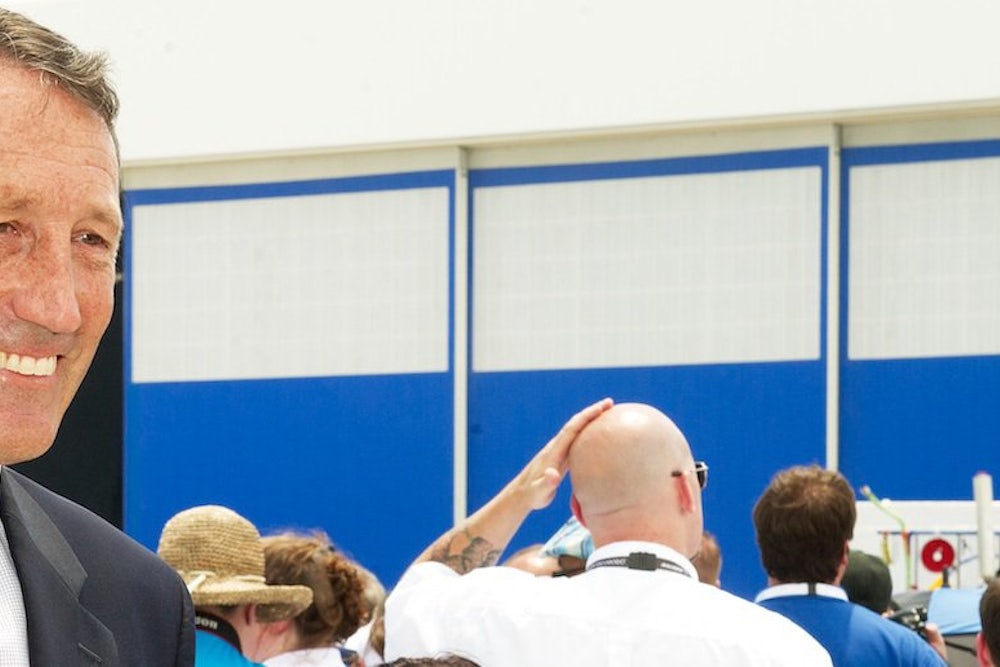Mark Sanford is one step closer to a remarkable political comeback after locking up the Republican nomination for Congress in South Carolina’s First Congressional District on Tuesday. A general election match-up in conservative South Carolina might seem like an easy final leg for Sanford, but there’s no guarantee that he’ll waltz to victory. Next month, Sanford will face off against Elizabeth Colbert Busch—Stephen’s sister—in a deeply conservative district where Democrats don’t usually have a chance. This time, they do.
At first glance, the district looks nearly unwinnable for Democrats. Across the country, only three Democrats represent districts as conservative as South Carolina’s First, and all three of them originally won modestly more moderate districts, and then barely hung on after Republican-led redistricting. In each case, the Democratic incumbent narrowly won his first election by fewer than 1,000 votes. Colbert Busch is not an incumbent, and no Democratic candidate has won an open seat as conservative as South Carolina’s First since at least 2008.
Against another opponent, it would be almost impossible for Colbert Busch to prevail. Romney won the district by 19 points last November, and the electorate may be even less favorable to Democrats in the upcoming special election. Nearly half of Obama voters in the district were African American, and black turnout tends to decline more than white turnout in off years. In the 2010 midterms, for instance, black turnout declined by 33 percent compared to 2008, while white turnout only declined by 26 percent.
But Colbert Busch has a real shot against Sanford, whose moral transgressions have turned off a lot of voters. A new Public Policy Survey shows Colbert Busch actually starting out with a narrow two-point lead, 47-45. Only 76 percent of Republicans support Sanford, with an unusually high 39 percent holding an unfavorable impression of him. Unsurprisingly, 59 percent of women also hold an unfavorable impression of the Appalachian Trail’s famous hiker.
There’s also more historical evidence to support Colbert Busch’s bid. In 2008, Republican Henry Brown nearly lost reelection in South Carolina’s First Congressional District, beating Democrat Linda Ketner by just 4 points. That result might indicate that an influx of affluent northerners to coastal resort communities has given the district more swing voters than other areas that have voted similarly in presidential elections.
And the unpredictability of a special election should also factor in Colbert Busch’s favor. In a low turnout election, party unity and enthusiasm can make the difference. The special election comes just one month after a divisive GOP primary, and there’s cause to question how many of his primary challenger Curtis Bostich’s evangelical supporters will actually turnout. Sanford doesn’t have much time to repair wounds, unify the party, and attack Colbert Busch, potentially denying him the opportunity to execute an otherwise effective plan to win a conservative district.
None of this assures Colbert Busch of victory, of course. Far from it. Although PPP puts her within striking distance at 47 percent, almost all of the undecided voters supported Romney in 2012. A large number of Romney voters--36 percent--don’t know enough to formulate an opinion of Colbert Busch. The RNC will probably invest the resources necessary to characterize her as a liberal unfit to represent a conservative district. If these attacks can overcome Sanford’s character issues and unify the party, Colbert Busch will struggle to succeed. But against a flawed opponent, a Democratic victory in deeply conservative territory can’t be ruled out. After all, Democrats came within four points of unseating an incumbent in this district just five years ago and there’s room for low conservative turnout to make the difference.
